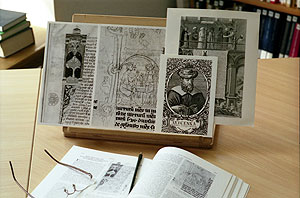FS griechisch-arabisch-lateinische Tradition
Forschungsstelle Philosophie- und Wissenschaftsgeschichte der griechisch-arabisch-lateinischen Tradition

Diese Forschungsstelle des Instituts für Philosophie fördert das wissenschaftliche Studium der griechisch-arabisch-lateinischen Tradition und gibt ihm einen institutionellen Ort. Sie dient generell als Anlaufstelle für Anfragen aus Wissenschaft und Öffentlichkeit zum arabischen Einfluss in Europa. Erfahren Sie mehr dazu:
Leitung: Prof. Dr. Dag Nikolaus Hasse
Arbeitsgruppen:
(1) Critical edition: Averroes’ Long commentary on Aristotle's Metaphysics (Averroes latinus)
D.N. Hasse together with:
- Dr. Stefan Georges
Averroes' Long commentary on Aristotle's Metaphysics is available as a complete critical edition only in Arabic. Of the Latin translation, which is historically far more influential, only four of the eleven books have been edited so far, and only a small portion of the surviving textual witnesses have been evaluated for these editions. A critical edition of the entire Latin version is being prepared, which includes an evaluation of all 135 surviving textual witnesses and a collation of the manuscripts C (Paris, Bibliothèque nationale de France, Latin 15453), On (Oxford, New College Library, 284), Ve (Venice, Biblioteca Nazionale Marciana, Lat. VI,45 = 3065), Vi (Venice, Biblioteca Nazionale Marciana, Lat. Z. 248 = 1504), Vx (Vatican, Biblioteca Apostolica Vaticana, Vat. lat. 2080) Jhd.) and Wi (Wien, Austrian National Library, 185) as well as the early prints I (Padua: Canozzi, 1473) and Z (Venice: Giunta, 1562). An English translation of the edited text is also being prepared. The edition is part of the large-scale project “Corpus Commentariorum Averrois in Aristotelem”, whose Latin series is being published on behalf of the Nordrhein-Westfälische Akademie der Wissenschaften and the Union Académique Internationale.
(2) Lexikon: Arabic and Latin Glossary (DFG-Langfristvorhaben 2013-2025)
D.N. Hasse together with:
- Dr. Katrin Fischer
- Stefanie Gsell, M.A.
- Susanne Hvezda, M.A.
- Dr. des. Barbara Jockers
- Eva Sahr, M.A.
- Dr. Jens Ole Schmitt
- Peter Tarras, M.A.
- Raphael Kretz, M.A. (IT)
The Arabic and Latin Glossary is a dictionary of the vocabulary of the Arabic–Latin translations of the Middle Ages.
The Glossary aims to improve our understanding of the Arabic influence on Latin scientific vocabulary, the shared intellectual history of West Asia, North Africa and Europe, and the identity and techniques of the translators. It is a lexical aid for modern editors of Latin texts translated from Arabic. At the same time, it contributes to Arabic lexicography by offering much information on the vocabulary of classical Arabic sciences and philosophy. It documents a chapter of history that is important for the self-understanding of contemporary European culture: the great cultural achievement of Latin translators from Arabic.
(3) Ptolemaeus Arabus et Latinus (Bayerische Akademie der Wissenschaften/Universität Würzburg, financed in the Akademienprogramm 2013-2037)
http://ptolemaeus.badw.de/start
D.N. Hasse together with:
- Dr. David Juste
- Dr. Benno van Dalen
- and others
Claudius Ptolemaeus (2nd cent. AD) is one of the most influential scientists of all time. He owes his fame mainly to two writings on astronomy: the Almagest and the Tetrabiblos.
The project is dedicated to the edition and study of the Arabic and Latin versions of Ptolemy’s astronomical and astrological texts and related material. These include works by Ptolemy or attributed to him, commentaries thereupon, and other works that are of immediate relevance to understanding Ptolemy’s heritage in the Middle Ages and the early modern period up to 1700 AD.
The exploration of the Ptolemaic tradition provides new insights into the common foundations of Islamic and European culture in the Middle Ages, the closely intertwined history of astronomy and astrology, the achievements and constant reform efforts of medieval scientists, and finally the preconditions and achievements of the Copernican revolution.
(4) Complete Catalogue of Arabic-Latin Translations and Translators of the Middle Ages (DFG, 2024-2027)
https://www.arabic-latin-corpus.philosophie.uni-wuerzburg.de/
D.N. Hasse together with:
- Dr. Irina Galynina
- Andreas Büttner, M.A.
The Arabic-Latin translators of the Middle Ages had an enormous influence on European intellectual history, comparable to the Bible translators of antiquity and the Latin translators from Greek. The study of the Arabic-Latin translators is confronted with many puzzles, mainly concerning the identity of the anonymous translators, the time and place of translation, and the identification of the texts themselves. The solution to these puzzles will be addressed systematically and comprehensively for the first time in this project. The project will produce an annotated complete catalogue of all Arabic-Latin translations with approximately 550 entries, which will replace the previous catalogue by Ferdinand Wüstenfeld from 1877 with 198 entries. The complete catalogue will serve as a reference work for many medievalist disciplines. For the first time, systematic reasons for identifying translators will be researched for each of the ca. 550 translations. The project provides solutions to central philological, historical and computer-philological problems of the Arabic-Latin tradition, which will be published in a series of research articles. In this way, the project makes an important contribution to the understanding of the shared West Asian-North African-European culture of knowledge, which was shaped by pagan-ancient, Muslim, Jewish and Christian authors and linked by translations.






